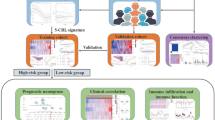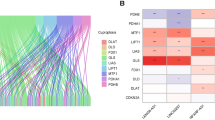Abstract
Background
Since the mechanism of cuproptosis was recently revealed, many molecules related to this pathway have been widely concerned and exploited to have prognostic potential. However, it is still unknown whether the transcription factors related to cuproptosis could be competent as tumor biomarkers of colon adenocarcinoma (COAD).
Objective
To analyze the prognostic potential of cuproptosis-related transcription factors in COAD, and validate the representative molecule.
Methods
Transcriptome data and patients’ clinical parameters were obtained from the TCGA and GEO database. 19 cuproptosis genes were identified through literature consulting. Cuproptosis-related transcription factors were screened by COX regression analyses. Multivariate Cox regression was applied to construct the signature. Prognostic effects were evaluated by Kaplan Meier survival analyses and ROC analyses. KEGG, GO, and ssGSEA analyses were performed for function prediction. 48 COAD tissues were collected for immunohistochemistry stain to observe the expression level and prognostic value of E2F3.
qRT-PCR was performed to detect mRNA expression levels, while cell viability assay was applied to detect the response of COAD cells to elesclomol treatment.
Results
A novel signature based on 3 prognostic transcription factors related to cuproptosis was successfully established and verified. Patients in the low-risk group tended to have better overall survival and lower immune phenotype scores than those in the high-risk group. Meanwhile, we also constructed a nomogram based on this signature and predict 10 candidate compounds targeting this signature. As an essential member of this signature, E2F3 was confirmed to be overexpressed in COAD tissues and was associated with poor prognosis of COAD patients. Importantly, CuCl2 and cuproptosis inducer elesclomol treatment could increase the expression of E2F3 in COAD cell while the overexpression of E2F3 significantly enhanced the resistance of COAD cells to elesclomol treatment.
Conclusion
Our research has identified a new prognostic biomarker and provides some innovative insights into the diagnosis and therapy of patients with COAD.








Similar content being viewed by others
Data availability
All data supporting our outcomes will be obtained from the corresponding authors upon appropriate requests.
Abbreviations
- COAD:
-
Colon adenocarcinoma
- CTFPS:
-
CTF-based prognostic signature
- IC:
-
Immune checkpoint
- IHC:
-
Immunohistochemistry
- IRS:
-
Immunoreactive score
- PFS:
-
Progression-free survival
- CTF:
-
Cuproptosis-related transcription factor
- DFS:
-
Disease-free survival
- ICB:
-
Immune checkpoint blocker
- IPS:
-
Immunophenotypic score
- OS:
-
Over survival
- TF:
-
Transcription factor
References
Arnold D, Stein A (2012) Personalized treatment of colorectal cancer. Onkologie 35(Suppl 1):42–48
Bian Z, Fan R, Xie L (2022) A novel cuproptosis-related prognostic gene signature and validation of differential expression in clear cell renal cell carcinoma. Genes (basel) 13:851
Biller LH, Schrag D (2021) Diagnosis and treatment of metastatic colorectal cancer: a review. JAMA 325:669–685
Cheng Y, Han X, Mo F, Zeng H, Zhao Y, Wang H, Zheng Y, Ma X (2021) Apigenin inhibits the growth of colorectal cancer through down-regulation of E2F1/3 by miRNA-215-5p. Phytomedicine 89:153603
Cobine PA, Brady DC (2022) Cuproptosis: Cellular and molecular mechanisms underlying copper-induced cell death. Mol Cell 82:1786–1787
Cobine PA, Moore SA, Leary SC (2021) Getting out what you put in: Copper in mitochondria and its impacts on human disease. Biochim Biophys Acta Mol Cell Res 1868:118867
da Silva DA, De Luca A, Squitti R, Rongioletti M, Rossi L, Machado CML, Cerchiaro G (2022) Copper in tumors and the use of copper-based compounds in cancer treatment. J Inorg Biochem 226:111634
Dieu-Nosjean MC, Caux C (2019) The biology of PD1 and CTLA-4 as immunotherapeutic targets and the issue of biomarkers. Med Sci (paris) 35:957–965
Edner NM, Carlesso G, Rush JS, Walker LSK (2020) Targeting co-stimulatory molecules in autoimmune disease. Nat Rev Drug Discov 19:860–883
Fang Y, Gu X, Li Z, Xiang J, Chen Z (2013) miR-449b inhibits the proliferation of SW1116 colon cancer stem cells through downregulation of CCND1 and E2F3 expression. Oncol Rep 30:399–406
Fatfat M, Merhi RA, Rahal O, Stoyanovsky DA, Zaki A, Haidar H, Kagan VE, Gali-Muhtasib H, Machaca K (2014) Copper chelation selectively kills colon cancer cells through redox cycling and generation of reactive oxygen species. BMC Cancer 14:527
Fu Y, Hong L, Xu J, Zhong G, Gu Q, Gu Q, Guan Y, Zheng X, Dai Q, Luo X et al (2019) Discovery of a small molecule targeting autophagy via ATG4B inhibition and cell death of colorectal cancer cells in vitro and in vivo. Autophagy 15:295–311
Hargadon KM, Johnson CE, Williams CJ (2018) Immune checkpoint blockade therapy for cancer: an overview of FDA-approved immune checkpoint inhibitors. Int Immunopharmacol 62:29–39
Jo YK, Roh SA, Lee H, Park NY, Choi ES, Oh JH, Park SJ, Shin JH, Suh YA, Lee EK et al (2017) Polypyrimidine tract-binding protein 1-mediated down-regulation of ATG10 facilitates metastasis of colorectal cancer cells. Cancer Lett 385:21–27
Joliffe IT, Morgan BJ (1992) Principal component analysis and exploratory factor analysis. Stat Methods Med Res 1:69–95
Jungwirth U, Kowol CR, Keppler BK, Hartinger CG, Berger W, Heffeter P (2011) Anticancer activity of metal complexes: involvement of redox processes. Antioxid Redox Signal 15:1085–1127
Kroemer G, Galluzzi L, Zitvogel L, Fridman WH (2015) Colorectal cancer: the first neoplasia found to be under immunosurveillance and the last one to respond to immunotherapy? Oncoimmunology 4:e1058597
László L (2010) Predictive and prognostic factors in the complex treatment of patients with colorectal cancer. Magy Onkol 54:383–394
Li YW, Wang XH, Nin Q, Luo XP (2008) Excessive copper induces hepatocyte apoptosis and affects Bax and Bcl-2 expression in rat liver. Zhongguo Dang Dai Er Ke Za Zhi 10:42–46
Li SR, Bu LL, Cai L (2022) Cuproptosis: lipoylated TCA cycle proteins-mediated novel cell death pathway. Signal Transduct Target Ther 7:158
Liu H, Zhang Y, Zheng S, Weng Z, Ma J, Li Y, Xie X, Zheng W (2016) Detention of copper by sulfur nanoparticles inhibits the proliferation of A375 malignant melanoma and MCF-7 breast cancer cells. Biochem Biophys Res Commun 477:1031–1037
Liu L, Yao H, Zhou X, Chen J, Chen G, Shi X, Wu G, Zhou G, He S (2022) MiR-15a-3p regulates ferroptosis via targeting glutathione peroxidase GPX4 in colorectal cancer. Mol Carcinog 61:301–310
Mangalmurti A, Lukens JR (2022) How neurons die in Alzheimer’s disease: Implications for neuroinflammation. Curr Opin Neurobiol 75:102575
Mattie MD, Freedman JH (2004) Copper-inducible transcription: regulation by metal- and oxidative stress-responsive pathways. Am J Physiol Cell Physiol 286:C293-301
Miyazaki T, Atarashi Y, Yasumura S, Minatoya I, Ogawa K, Iwamoto M, Minemura M, Shimizu Y, Sato TA, Watanabe A et al (2006) Fas-associated phosphatase-1 promotes Fas-mediated apoptosis in human colon cancer cells: novel function of FAP-1. J Gastroenterol Hepatol 21:84–91
Oliveri V (2022) Selective targeting of cancer cells by copper ionophores: an overview. Front Mol Biosci 9:841814
Shanbhag V, Jasmer-McDonald K, Zhu S, Martin AL, Gudekar N, Khan A, Ladomersky E, Singh K, Weisman GA, Petris MJ (2019) ATP7A delivers copper to the lysyl oxidase family of enzymes and promotes tumorigenesis and metastasis. Proc Natl Acad Sci USA 116:6836–6841
Siegel RL, Miller KD, Fuchs HE, Jemal A (2022) Cancer statistics, 2022. CA Cancer J Clin 72:7–33
Song MO, Mattie MD, Lee CH, Freedman JH (2014) The role of Nrf1 and Nrf2 in the regulation of copper-responsive transcription. Exp Cell Res 322:39–50
Tang S, Ning Q, Yang L, Mo Z, Tang S (2020) Mechanisms of immune escape in the cancer immune cycle. Int Immunopharmacol 86:106700
Tang D, Chen X, Kroemer G (2022) Cuproptosis: a copper-triggered modality of mitochondrial cell death. Cell Res 32:417–418
Thorne JL, Campbell MJ, Turner BM (2009) Transcription factors, chromatin and cancer. Int J Biochem Cell Biol 41:164–175
Tsvetkov P, Coy S, Petrova B, Dreishpoon M, Verma A, Abdusamad M, Rossen J, Joesch-Cohen L, Humeidi R, Spangler RD et al (2022) Copper induces cell death by targeting lipoylated TCA cycle proteins. Science 375:1254–1261
Vishnoi K, Viswakarma N, Rana A, Rana B (2020) Transcription factors in cancer development and therapy. Cancers (basel) 12:2296
Voutsadakis IA (2015) Pluripotency transcription factors in the pathogenesis of colorectal cancer and implications for prognosis. Biomark Med 9:349–361
Wang Y, Zhang L, Zhou F (2022) Cuproptosis: a new form of programmed cell death. Cell Mol Immunol. https://doi.org/10.1038/s41423-022-00866-1
Xu M, Mu J, Wang J, Zhou Q, Wang J (2022) Construction and validation of a cuproptosis-related lncRNA signature as a novel and robust prognostic model for colon adenocarcinoma. Front Oncol 12:961213
Zamanian-Azodi M, Rezaei-Tavirani M, Hasanzadeh H, Rahmati Rad S, Dalilan S (2015) Introducing biomarker panel in esophageal, gastric, and colon cancers; a proteomic approach. Gastroenterol Hepatol Bed Bench 8:6–18
Zhang C, Zeng Y, Guo X, Shen H, Zhang J, Wang K, Ji M, Huang S (2022a) Pan-cancer analyses confirmed the cuproptosis-related gene FDX1 as an immunotherapy predictor and prognostic biomarker. Front Genet 13:923737
Zhang G, Sun J, Zhang X (2022b) A novel Cuproptosis-related LncRNA signature to predict prognosis in hepatocellular carcinoma. Sci Rep 12:11325
Zhang H, Shi Y, Yi Q, Wang C, Xia Q, Zhang Y, Jiang W, Qi J (2022c) A novel defined cuproptosis-related gene signature for predicting the prognosis of lung adenocarcinoma. Front Genet 13:975185
Zhang Y, Zhou L, Xu Y, Zhou J, Jiang T, Wang J, Li C, Sun X, Song H, Song J (2022d) Targeting SMYD2 inhibits angiogenesis and increases the efficiency of apatinib by suppressing EGFL7 in colorectal cancer. Angiogenesis. https://doi.org/10.1007/s10456-022-09839-4
Acknowledgements
We thank all developers of the databases and R software packages involved in the present research.
Funding
This research was supported by the Special Funds for Science Development of the Clinical Teaching Hospitals of Jiangsu Vocational College of Medicine (20229121).
Author information
Authors and Affiliations
Contributions
LMT, and TJ conceived and designed this study. YWZ and YYX downloaded and sorted out the relevant data from the TCGA database. LZ and TJ screened the CTFs, constructed and validated the CTFPS, predicted the function, established the nomogram, and predicted candidate compounds. LZ, YWZ, and YXX conducted IHC, evaluated the IRS, and performed the qRT-PCR and cell viability assays. LZ, LMT and TJ designed the primers, analyzed the data, plotted the figures, drew the table, and wrote the manuscripts. All authors have read and approved the manuscript.
Corresponding authors
Ethics declarations
Conflict of interest
The authors declare that they have no competing interests.
Additional information
Publisher's Note
Springer Nature remains neutral with regard to jurisdictional claims in published maps and institutional affiliations.
Supplementary Information
Below is the link to the electronic supplementary material.
Rights and permissions
Springer Nature or its licensor (e.g. a society or other partner) holds exclusive rights to this article under a publishing agreement with the author(s) or other rightsholder(s); author self-archiving of the accepted manuscript version of this article is solely governed by the terms of such publishing agreement and applicable law.
About this article
Cite this article
Zhou, L., Zhang, Y., Xu, Y. et al. Identification of a novel prognostic signature composed of 3 cuproptosis-related transcription factors in colon adenocarcinoma. Genes Genom 45, 1047–1061 (2023). https://doi.org/10.1007/s13258-023-01406-5
Received:
Accepted:
Published:
Issue Date:
DOI: https://doi.org/10.1007/s13258-023-01406-5




